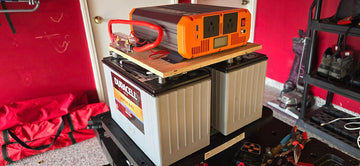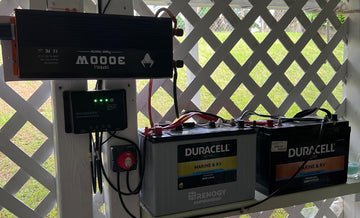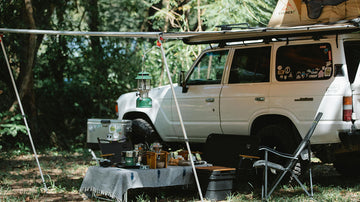Solar energy is favoured by more and more households and businesses due to its environmentally friendly and economical nature. Solar panels are rapidly gaining popularity as a core component of this green energy source. However, many people are still confused about how to safely and efficiently connect solar panels to batteries when using solar power systems. The seemingly simple step of connecting the solar panels directly to the battery actually involves many technical details and safety hazards.
In this article, we will take a closer look at the connection of solar panels to batteries, analysing the feasibility of a direct connection and the possible risks it entails. At the same time, we will shed light on the importance of using a charge controller and its key role in improving system efficiency and protecting the battery. We will also show the steps of the correct connection method in order to provide the reader with a practical guide.
Table of contents:
Solar panels and batteries
When explaining the connection of solar panels and batteries, we have to know more about solar panels, batteries.
Solar panels are mainly made up of photovoltaic cells which are capable of converting sunlight into electricity. When sunlight strikes the cells, photons excite electrons, which creates an electric current. Solar panels usually output a certain voltage and current, the exact values of which depend on the type and area of the panel. Common household solar panels may output between 18V and 24V in full sunlight, and the current varies with light intensity.
Common battery types include lead-acid, lithium and nickel-cadmium batteries. Each type of battery has different charging principles and voltage requirements. Lead-acid batteries require a higher charging voltage to ensure charging, while lithium batteries are more sensitive to changes in voltage and current. In addition, the charging cycle and deep discharge of a battery can have a significant impact on its lifespan.
While solar panels convert sunlight into direct current (DC) through the photovoltaic effect, batteries are devices that store electrical energy, also in the form of direct current. On the face of it, connecting a solar panel directly to a battery seems like a straightforward and easy way to capture and store solar energy. However, the reality is far more complex. In order to ensure a steady supply of electricity and a safe battery life, it is often necessary to connect the solar panel to the battery using a charge controller
Risks of connecting solar panels directly to batteries
Simply connecting a solar panel directly to a battery may seem convenient, but there are many risks involved:
- Voltage matching problem: The output voltage of the solar panel may not match the required voltage of the battery. If the output voltage of the solar panel is higher than the accepted voltage of the battery, it may cause the battery to be overcharged, which may damage the battery.
- Risk of current overload: Under strong light conditions, the solar panel may output more current than the battery can accept, which may cause the battery to heat up, damage or even catch fire.
- Overcharging Risk: Solar panels generate high voltages and currents when the sun is shining, and if they are connected directly to the battery without proper control mechanisms, they can easily lead to overcharging of the battery, which can shorten the life of the battery, or even lead to safety issues such as fires or explosions.
Conditions in which solar panels can be linked directly to the battery
Although a solar charge controller is recommended in most cases, there are specific conditions under which a solar panel can be linked directly to a battery. Here are some of the possible situations:
- Small systems: for small or low-power applications, such as small outdoor lights or portable devices, solar panels can be connected directly because their low output power usually does not overcharge the battery.
- Lead-acid batteries: Some older or simple lead-acid batteries can withstand a range of charging voltages without the need for high-precision management. Therefore, in some basic applications, direct connection has been chosen despite the higher risk.
- Short-term tests or experiments: When conducting short-term tests or experiments, in order to quickly verify the working status of the solar panel, users sometimes choose to temporarily connect the battery directly. However, this practice should be done carefully and for a short period of time to avoid prolonged use.
How to safely connect solar panels to batteries
In order to ensure a safe connection between the solar panel and the battery, a key component, the solar charge controller, must be introduced.
Choosing the right charge controller: The right controller should be chosen based on the specifications of the solar panel and the type of battery. Two common types of controllers are PWM (Pulse Width Modulation) and MPPT (Maximum Power Point Tracking).
The Role of Solar Charge Controller
The solar charge controller is an important device that connects the solar panel to the battery with a variety of intelligent functions to ensure that the system operates safely and efficiently. The following are the main functions of the solar charge controller:

- Anti-overcharge protection: the charge controller constantly monitors the battery voltage, and when the battery voltage is close to the full state, it will automatically cut off or reduce the charging current, thus effectively preventing the occurrence of the battery overcharge phenomenon and prolonging the service life of the battery.
- Anti-reverse connection protection: The charge controller has an anti-reverse connection protection function, which can prevent the short circuit or equipment damage caused by the reverse battery connection and guarantee the safety of the system.
- Voltage adjustment: According to the type of battery (such as lead-acid, lithium batteries, etc.), the charge controller can automatically adjust the charging voltage to ensure the best charging effect, to avoid damage to the battery due to the mismatched voltage.
- Current limitation: The charge controller can also limit the maximum charging current to protect the battery from high current shock, especially in the case of rapid charging, which improves the safety of charging.
By using solar charge controllers, battery damage and system failures, which are common in the industry, can be effectively avoided, thus improving the safety and reliability of the overall connection. Therefore, it is recommended to always use a proper charge controller for most solar systems.
How to Connect Charge Controller to Battery and Solar Panel

Connecting the charge controller to the battery and solar panel is a fundamental step in building a solar system, and the correct connection will ensure the system operates safely and efficiently. Below are the connection steps:
Connection steps
1. Prepare tools and materials:
- Solar panel
- Solar charge controller
- Battery (e.g. lead-acid or lithium battery)
- Connection cable (suitable cable with suitable connectors or clamps)
- Screwdriver (depending on the type of connector used)
- Insulation tape (for safety protection)
2. Confirm battery voltage and charge controller compatibility:
Ensure that the solar panel, battery and charge controller voltages match (e.g., a 12V system typically includes a 12V battery and a 12V charge controller).
3.Switch off all equipment:
Before making any connections, make sure all equipment is turned off to avoid electric shock or short circuit.
4.Connect the battery to the charge controller:
- Locate the battery connector on the charge controller (usually labelled ‘BAT’ or ‘BATT’).
- Connect the positive terminal (red wire) of the battery to the positive (+) terminal of the charge controller.
- Connect the negative terminal (black wire) of the battery to the negative (-) terminal of the charge controller.
- Make sure the connection is secure and avoid loosening.
5. Connect the solar panel to the charge controller:
- Find the solar panel connector (usually labelled ‘PV’ or ‘SOLAR’) on the charge controller.
- Connect the positive terminal (red wire) of the solar panel to the positive (+) terminal of the charge controller.
- Connect the negative terminal (black wire) of the solar panel to the negative (-) terminal of the charge controller.
- Again, make sure the connection is good.
6.Check connections:
Before energising the unit, double check that all connections are correct and ensure that there are no short-circuit hazards.
7. energise:
- First connect the battery, then connect the solar panel.
- After that, you can switch on the charge controller and observe whether the indicator lights are working properly (see the instruction manual of the charge controller for the specific indicator lights and their meanings).
8. monitoring:
After the connection is completed, you can monitor the output of the charge controller to ensure that the current and voltage are within the safe range, and observe the battery charging status.
9. Precautions
- Wire Selection: Ensure that the appropriate size wire is used to avoid heating caused by too thin a wire.
- Environment: Install the charge controller and other equipment in a dry and ventilated place, avoid direct sunlight and humid environment.
- Anti-reverse connection protection: Some charge controllers have anti-reverse connection protection, but it is not always reliable, so make sure the connection is correct.
Following these steps to connect the charge controller to the battery and solar panel will ensure that the system works safely and efficiently. If in doubt, it is recommended to refer to the manual of the device or consult a professional.
Summary
Solar panels should not be connected directly to the battery. There are very many risks associated with connecting directly to a battery. In order to ensure the safe and efficient use of solar energy, it is necessary to use a solar charge controller as an intermediate device. By choosing and using solar charge controllers appropriately, we can effectively prevent problems such as battery overcharging, voltage mismatch and current fluctuation, thus prolonging battery life and improving the overall performance of the solar system.
FAQ
Can I connect my solar panel directly to my car battery?
Direct connection is not recommended. The output voltage and current of the solar panel may not be suitable for the car battery, and direct connection may lead to overcharging or damage. It is recommended to use a charge controller to regulate the current and voltage.
Can I connect the solar panel directly to the lithium battery?
Again, direct connection is not recommended. Lithium batteries have strict requirements on charging voltage and current, and the use of a charge controller can ensure safe and effective charging.
Can I use solar panels to charge multiple batteries?
Yes, but you need to make sure that the charge controller can support the connection of multiple batteries, and the battery type and capacity should match.
How long does it take to charge a battery with a solar panel?
Charging time depends on a number of factors, including the power of the solar panel, the capacity of the batteries, weather conditions and the intensity of the sun's light. In general, a full charge may take anywhere from a few hours to a few days.
Can solar panels be used on all types of batteries?
Not all types of batteries are suitable. Different types of batteries (e.g. lead-acid batteries, lithium batteries, etc.) require different charging voltages and currents, so you need to check compatibility before connecting them.













